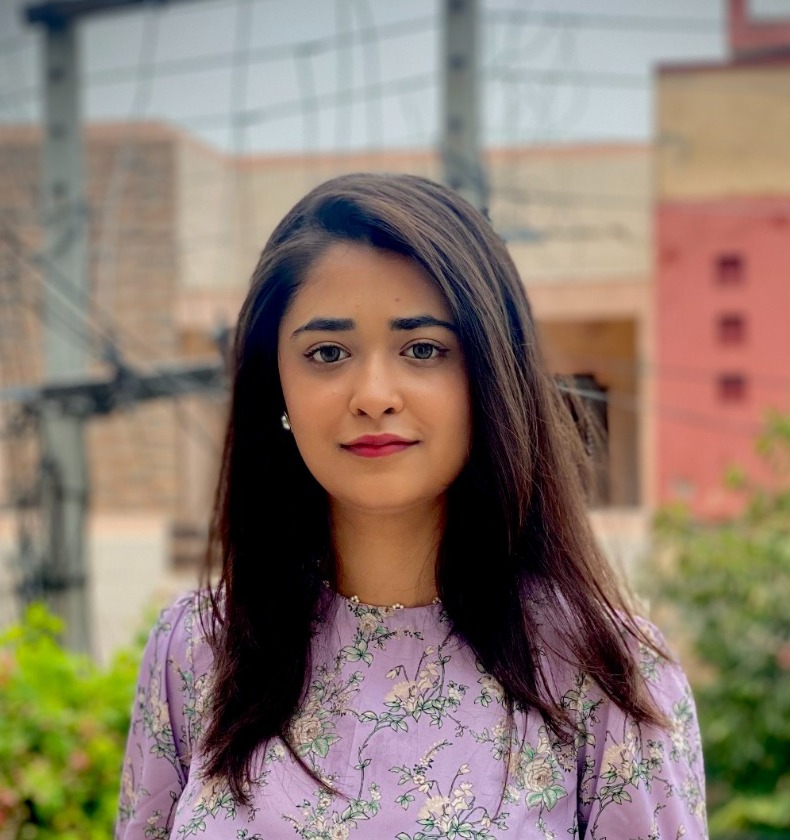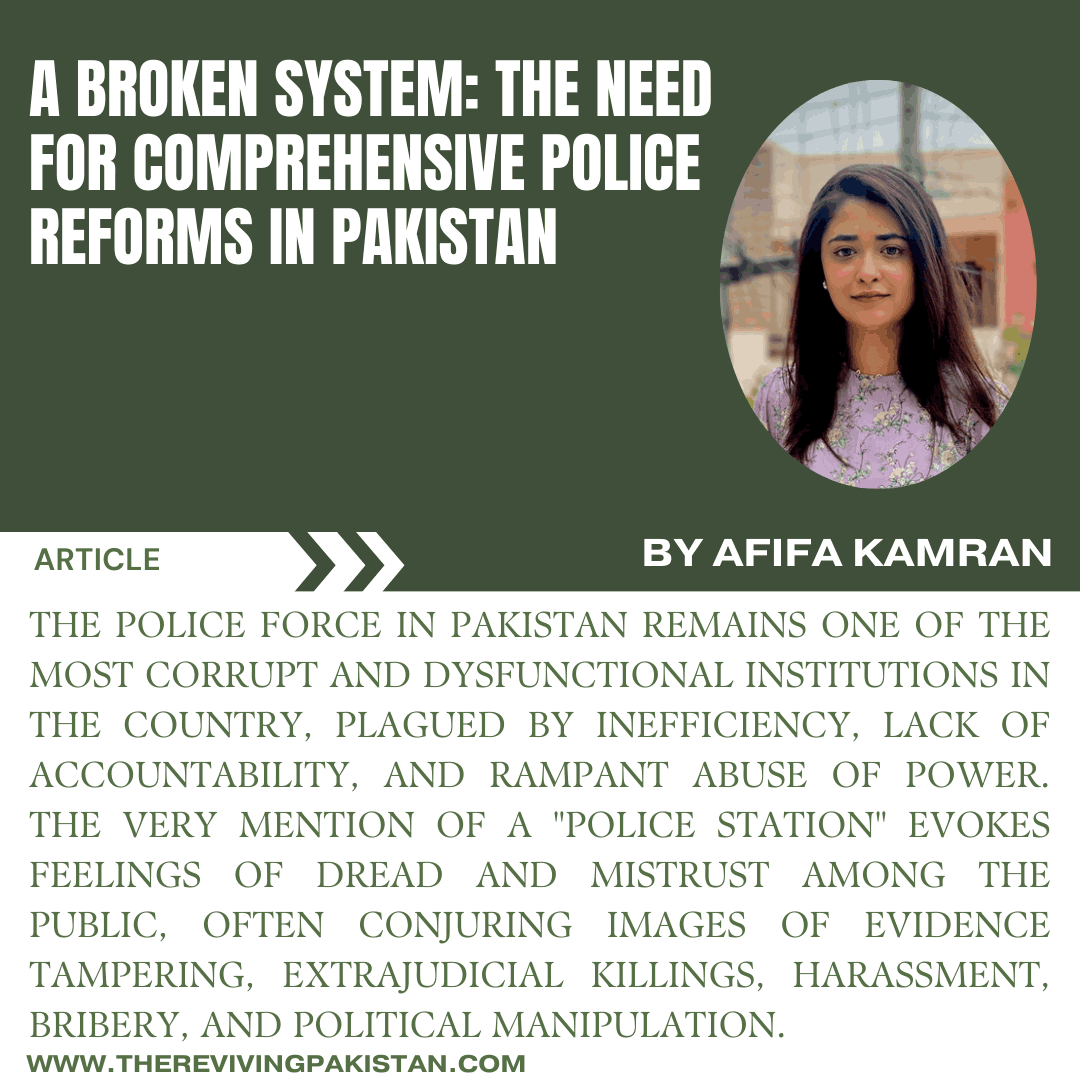About the Author(s)

The police force in Pakistan remains one of the most corrupt and dysfunctional institutions in the country, plagued by inefficiency, lack of accountability, and rampant abuse of power. The very mention of a “police station” evokes feelings of dread and mistrust among the public, often conjuring images of evidence tampering, extrajudicial killings, harassment, bribery, and political manipulation. Far from being a place of refuge, the police are seen as instruments of oppression, especially for women and the underprivileged. According to Transparency International’s 2022 Corruption Perceptions Index, 31% of Pakistanis who interacted with the police reported paying bribes—ranking it as the most corrupt public service in the country (Transparency International, 2022). Such a reality reinforces public distrust, with stations perceived not as places of justice but as hubs of bribery and political interference. As the situation worsens, calls for meaningful, research-backed reforms are becoming increasingly urgent.
Women and Marginalized Communities: Victims of a Broken System
Marginalized groups, particularly women, experience the brunt of police negligence and abuse. According to a 2020 report by the Aurat Foundation, cases of harassment, rape, and even custodial deaths involving women often go unpunished (Aurat Foundation, 2020). A particularly egregious example is the case of Tayyaba, a 10-year-old domestic worker in Islamabad who was tortured by her employers. Although her case gained public attention, the slow response of the police and the lack of immediate action highlighted systemic issues in handling cases involving vulnerable groups.
The Women’s Action Forum (WAF) has also pointed out that women frequently experience harassment when reporting crimes such as domestic abuse or sexual violence. This fear of re-victimization keeps many women from seeking justice. For instance, the Sindh Women’s Rights Commission, in its 2021 report, revealed that only 7% of domestic violence cases in Sindh are reported, largely due to fear of police harassment (Sindh Women’s Rights Commission, 2021).
Beyond gender, socio-economic status further complicates access to justice. A Human Rights Watch report (2022) indicates that the poorest communities are disproportionately targeted for police raids, extortion, and brutality. In Karachi’s Orangi Town, home to one of the largest informal settlements in the city, residents have reported being regularly targeted for bribes during police “crackdowns” on crime, where often the poorest individuals are falsely implicated due to their inability to pay off the authorities.
The Urgency of Depoliticizing Law Enforcement.
One of the most significant barriers to reforming Pakistan’s police is rampant political interference, which shields criminals and stifles honest officers. Political patronage has embedded itself deeply within the recruitment, transfer, and promotion process, making reform a challenge.
A telling case occurred in 2019 when the former Punjab Inspector General (IG), Captain Arif Nawaz Khan, was removed from his post after just six months in office due to political pressure (Dawn, 2019). Such frequent reshuffling of senior police officers, often for political reasons, destabilizes the law enforcement system. This politicization not only disrupts administrative efficiency but also enables the rise of politically connected criminal networks. In Sindh, for instance, political parties have long been accused of using police for “thana politics” (police station politics), where officers loyal to specific factions target rivals, enforce illegal land grabs or turn a blind eye to criminal activities in exchange for protection. To break this vicious cycle, police recruitment and promotion must be implemented under independent, merit-based systems.
Training and Modernization: Building a Professional Police Force.
Effective policing relies heavily on modern training techniques and infrastructure. Unfortunately, Pakistan’s police force is hampered by outdated practices, inadequate training, and poor facilities. Many police officers are poorly trained in forensic investigation, human rights, and community engagement. Instead, coercion and physical abuse remain the primary tools for investigation. According to a 2020 report by the Human Rights Commission of Pakistan (HRCP), an estimated 70% of detainees in police custody face some form of physical abuse during interrogations.
In 2015, Khyber Pakhtunkhwa (KP) became a model for police reform, focusing heavily on training and community-based policing. Under the leadership of IG Nasir Khan Durrani, the KP police force introduced a Police Training School in Nowshera, which offered specialized courses in criminal investigation, cybercrime, and counter-terrorism. The success of KP’s police modernization programs, which saw a significant reduction in crime rates by 30%, demonstrates that targeted training and education can reshape law enforcement.
Beyond training, the physical state of Pakistan’s police stations reflects the force’s inadequacies. The National Police Bureau (NPB) found in a 2019 audit that nearly 65% of police stations in Pakistan are dilapidated and lack basic resources like computers, forensic labs, or even safe detention facilities. The modernization of these stations, similar to initiatives seen in countries like Georgia, where police stations were transformed into transparent, accessible, and technology-enabled hubs, could significantly improve operational effectiveness and public trust.
Introducing Technology and Accountability.
Technology holds transformative potential for Pakistan’s police force. For example, the Pakistan Telecommunication Authority (PTA) maintains a database of SIM card registrations, and a similar centralized system could be implemented for the police. A national database containing biometric information, such as fingerprints, could revolutionize crime-solving by making it easier to identify suspects and track criminal activity.
However, technology must be coupled with accountability. Increasing police salaries without improving accountability is not enough to combat corruption. According to the Pakistan Institute of Legislative Development and Transparency (PILDAT), while raising salaries may reduce the need for petty bribes, without institutional reform, it will not deter high-level corruption. Regular audits and performance evaluations are crucial, as well as empowering internal affairs departments to investigate misconduct.
Countries like Singapore, which has one of the least corrupt police forces in the world, rely heavily on internal watchdogs and external agencies to monitor police behaviour. Pakistan could establish similar independent watchdogs that allow citizens to lodge complaints and report police misconduct, ensuring greater transparency.
Strengthening the Prosecution: A Key Partner in Law Enforcement.
An effective criminal justice system depends on close collaboration between the police and the prosecution. Unfortunately, Pakistan’s prosecution services are often just as inefficient and corrupt as the police, which severely hampers the justice process. According to the World Bank, nearly 40% of cases in Pakistan are delayed due to inefficiencies in the coordination between police investigations and prosecution services, leading to backlogs and extended trial periods.
This inefficiency was highlighted in the high-profile murder case of Zainab Ansari in 2018, where police initially mishandled evidence and failed to coordinate with prosecutors. It was only after widespread public outcry that the authorities fast-tracked the case, leading to the eventual conviction of the perpetrator.
Improving the prosecution system through specialized training in handling evidence, legal procedures, and ensuring that the police are aware of these standards is critical. Collaboration between law enforcement and legal experts could significantly improve case outcomes and reduce trial delays.
Putting an End to Abusive Practices.
Torture and extrajudicial “encounters” continue to plague Pakistan’s police system. Despite Pakistan being a signatory to international conventions against torture, including the United Nations Convention Against Torture (UNCAT), physical abuse of detainees is rampant. According to the Justice Project Pakistan (JPP), an estimated 1,000 cases of torture are reported annually, though the actual number is likely much higher due to underreporting.
Fake encounters, where suspects are extrajudicially killed by police officers under the guise of shootouts, are also common. The 2018 killing of Naqeebullah Mehsud, a young man falsely accused of terrorism in Karachi, sparked widespread protests and highlighted the abusive practices of the police. An inquiry revealed that at least 444 people had been killed in staged encounters by police officer Rao Anwar between 2011 and 2018. Such practices not only violate human rights but undermine the rule of law.
To curb such abuses, strong punitive measures must be implemented. Officers involved in torture or extrajudicial killings should face swift and harsh penalties, and investigations into police actions should be conducted by independent bodies.
Restoring Public Trust: Community Policing as a Model.
Community policing has shown promise in rebuilding trust between law enforcement and the public. In 2020, the KP government launched its Dispute Resolution Councils (DRCs), where police work alongside local community members to mediate disputes. According to a 2022 KP police report, the councils have resolved over 10,000 cases, reducing the burden on formal courts and preventing minor disputes from escalating into more serious conflicts.
Community policing could be expanded nationwide, particularly in urban centres like Karachi and Lahore, where public trust in the police is at an all-time low. Establishing specialized units within the police to deal with cases involving women, children, and minorities and engaging community leaders in decision-making could be a vital step in improving relations between law enforcement and the public.
Can These Reforms Succeed?
The real question is whether such reforms can take root in Pakistan’s complex and often unstable political climate. The country’s police system is a relic of its colonial past, and successive efforts at reform have largely failed due to political interference and a deeply ingrained culture of corruption. However, incremental changes may not be enough. The situation calls for drastic, systemic reforms that tackle the root causes of inefficiency and corruption. The creation of independent oversight bodies, reforms in the criminal justice system, and greater investment in training and technology could help break the cycle of dysfunction.
References:
- Aurat Foundation. (2020). Violence Against Women.
- Dawn. (2019). Punjab IG Arif Nawaz Khan removed.
- Human Rights Watch. (2022). Pakistan: Events of 2021.
- Khan, N. (2015). Police Reform in Khyber Pakhtunkhwa.
- Sindh Women’s Rights Commission. (2021). Annual Report Transparency.

